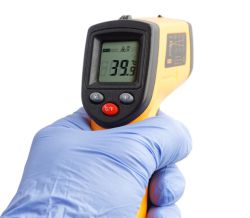Alternatives to Mercury
Choosing a mercury-free instrument can make a tremendous impact in reducing the potential for mercury exposure.
For many years it was thought that mercury is indispensable. Although there are instruments that are alternatives to mercury-containing equipment, their use was never widespread. Both mercury and aneroid sphygmomanometers have been in use for many years.
Of all mercury instruments used in health care, mercury sphygmomanometers (80-100 g/unit) use the most significant amount of mercury. Their widespread use collectively makes them one of the largest mercury reservoirs in the health care setting.
By choosing a mercury-free alternative, a health care institution can make a tremendous impact in reducing the potential for mercury exposure to patients, staff, and the environment. The thinking that aneroid sphygmomanometers do not give accurate readings has no basis in fact. When following proper maintenance protocol, aneroid sphygmomanometers provide accurate pressure measurements.
Knowledge Check Choose the best answer for the question.
1-10. Which mercury instrument uses the most significant amount of mercury in the healthcare setting?
You forgot to answer the question!

